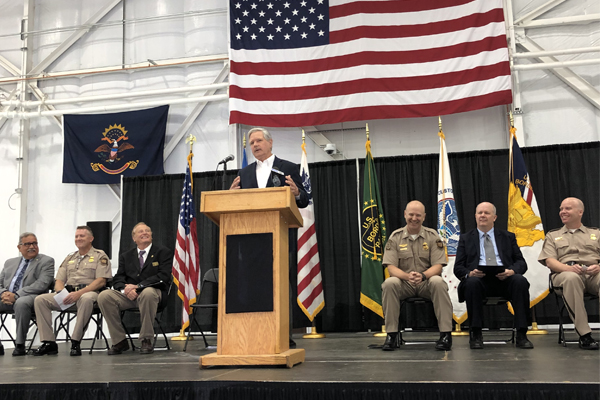Hoeven Marks Completion of CBP Unmanned Aerial Systems Training Center at Grand Forks Air Force Base
Senator Secured $8 Million to Ensure Facility Remained in Grand Forks Region
EMERADO, N.D. – Senator John Hoeven today marked the completion of the U.S. Customs and Border Protection’s (CBP) newly-renovated unmanned aerial systems (UAS) training center at the Grand Forks Air Force Base. Due to growing operations on the base, the CBP facility was previously required to relocate, however, an adequate facility was not available. As a member of the Senate Homeland Security Appropriations Committee, Hoeven secured $8 million in Fiscal Year (FY) 2017 funding to ensure the CBP training program remained in the region. Hoeven then brought the Acting CBP Commissioner to Grand Forks to review potential locations for the new facility, with the agency signing the lease for a building on the air base in September 2017.
“The CBP operating out of Grand Forks is responsible for 900 miles of border, and considering our state’s leadership in UAS, it only makes sense to keep this training facility right here,” Hoeven said. “That’s why we worked to identify an appropriate location and secure the $8 million that was needed to renovate a building on base. Continuing this training program will help ensure our border agents are prepared to make the best use of unmanned technology, bolstering our nation’s security and helping maintain our state’s status as a leader in all things UAS.”
Hoeven continues working to expand the state’s role as the nation’s proving ground for UAS research, development, training and operations. To this end, the senator is working as a member of the Senate Homeland Security Appropriations Committee to:
- Ensure the administration relies on the state’s UAS expertise, including when expanding its UAS border security operations.
- Hoeven has brought federal officials to North Dakota, including the Air Force and Homeland Security secretaries, to give them firsthand knowledge of local UAS capabilities and help advance this priority.
- Leverage efforts like the CBP’s Pathways Program at the University of North Dakota to address the nation’s pilot shortage, both for manned and unmanned aircraft.
- Similarly, Hoeven secured legislation that allows the National Guard to send unmanned aircraft pilots to a civilian contractor, like those at Grand Sky, for training if the Air Force lacks the capacity to train pilots in a timely fashion.
- Advance the implementation of the Preventing Emerging Threats Act of 2018, bipartisan legislation that Hoeven helped introduce and pass to support the development of counter-UAS technology and protect important facilities from potential misuse of unmanned aircraft.
- The senator also secured $13 million for counter-UAS in Fiscal Year 2019 funding legislation, while also directing the Department of Homeland Security to report on its funding needs in this area for the next five years.
-###-

Next Article Previous Article
